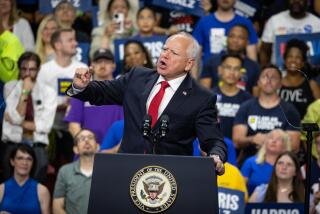Powell Repeats Draft Loophole Objections
WASHINGTON — Secretary of State Colin L. Powell, who served two tours in Vietnam before rising through the Army ranks to become head of the Joint Chiefs of Staff, restated on Sunday his long-standing objections to Vietnam-era draft policies that allowed the “sons of the powerful” to escape combat.
But Powell refused to enter the debate about the Vietnam-era service of President Bush and his Democratic challenger, Sen. John F. Kerry.
“We shouldn’t linger about what might or might not have been done or happened 35 years ago,” he said on “Fox News Sunday.”
The two candidates’ military service has become an issue in the presidential campaign.
Bush’s stateside service in the Texas Air National Guard during the height of the Vietnam War has led to allegations that he received preferential treatment in joining the Guard. And Kerry -- who received three Purple Hearts, the Bronze Star and the Silver Star as a Navy officer in Vietnam -- has seen critics attack the legitimacy of his medals.
In his 1995 autobiography, “My American Journey,” Powell said of the Vietnam-era draft policies:
“The policies determining who would be drafted and who would be deferred, who would serve and who would escape, who would die and who would live, were an anti-democratic disgrace.”
He went on: “I am angry that so many sons of the powerful and well-placed ... managed to wangle slots in Reserve and National Guard units.”
Asked on Fox if Bush’s National Guard service fell into that category, Powell said only: “I disagreed with the policies that were in place at that time. I didn’t think it was the right set of policies for the challenge the nation was facing. But those are the policies that were in place at that time.”
At the time Bush joined the Guard, his father was a congressman from Texas.
“That system was disturbing to me,” Powell said on ABC’s “This Week.” “That’s why I was such a supporter of the voluntary Army when it came.
“And I was also a supporter of cleaning up the draft system, so that you couldn’t duck the draft.”
Powell said on Fox that if the U.S. ever went back to conscription -- and he did not think it would have to -- he hoped it would be similar to the lottery system instituted at the end of the Vietnam War, so that “everybody is equally liable to be called to serve the nation in time of conflict.”
Asked on Fox if he felt the same way about the attacks on Bush’s service and on Kerry’s service, Powell said: “Both men volunteered to serve their nation under the policies that were in existence at that time. Both men did serve their nation, and both men were honorably discharged.
“And the last thing I’m going to do is get involved in this debate about who did what when and who earned what where and who was where when.”
During a session of “Meet the Press” on Sunday, Powell also said he had no indication there was a direct connection between the deposed Iraqi dictator Saddam Hussein and those who carried out the Sept. 11 attacks.
Later Sunday, Sen. John Edwards, the Democratic vice presidential candidate said Bush and Vice President Dick Cheney had deceived the American people by implying there was a link between the two.
“From this day forward, this administration should never suggest that there is,” Edwards told an AFL-CIO rally in Detroit. The Bush-Cheney campaign said Edwards’ attack was baseless.
More to Read
Get the L.A. Times Politics newsletter
Deeply reported insights into legislation, politics and policy from Sacramento, Washington and beyond. In your inbox three times per week.
You may occasionally receive promotional content from the Los Angeles Times.










